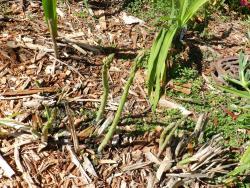Ken, I think gradually building up the soil level in your asparagus patch is a good way to go; my understanding is that the roots will basically seek their "comfort level," but I think adding too much all at once could smother them.
Cheshirekat - I don't think you would have any trouble with moving seedlings that were direct sown if you do it the first year; they are pretty tiny at that point. I definitely agree with Ken about moving older plants, though; very difficult to do, and hard on the plants (at best).
The stalks aren't particularly bothered by wind but they do get quite tall and will flop over; my patch is about 6 x 8' (3 rows 8' long) and I generally use some ring-type tomato cages to support them and/or make a temporary fence around it with stakes and twine once I'm done picking. If I was going to do it over I think I would make one long row along an edge somewhere in the garden, which would make it much easier to weed once the stalks have grown up.
Slugs have never been a problem on my asparagus, but I have asparagus beetles show up every year, usually when the first small stalks are getting "ferny," while I'm still picking the bigger ones. They not only can really defoliate the ferny foliage, but the eggs on the stalks that you want to eat aren't very appetizing...

I've been using a rotenone-based garden dust at the first sign of the beetles, and generally one or two applications keeps them under control for the whole summer (if done when there aren't many of them).
